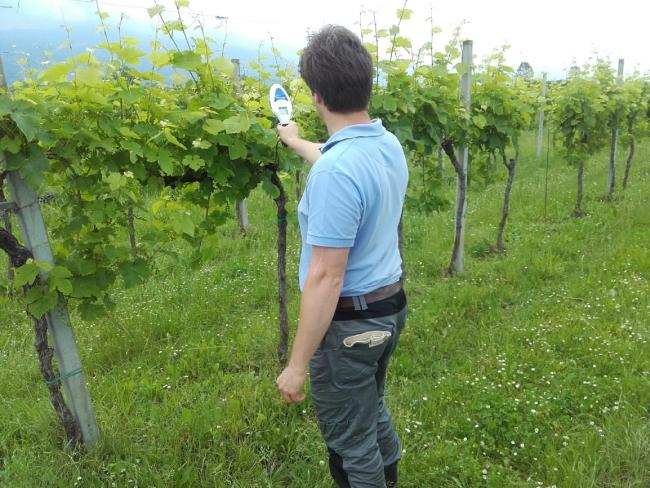Grow the sustainability towards a territorial protocol

The project objective is demonstrating the efficacy of vineyard cultivation approaches addressed to ‘sustainability’, with specific focus for ‘water’ resource.
The project faces 3 main technical matters related to viticulture: pest control (impact of pesticides), fertilisation (nutrient leaching), and irrigation (IrriSmart™ system). Technical solutions proposed by the project are characterized by high innovation level. Finally, the implementation of 2 certification standards are expected: VIVA and SQNPI.
Project actions include also training, mainly addressed to vine growers, and activities for disseminating the project contents.
PEST CONTROL: use of predictive models for improving the strategy of pest control, based on the analysis of meteorological data (in cooperation with OG BODI – Condifesa TVB)
FERTILIZATION: substitution of synthetic fertilizers with organic ones, use of vigour maps for regulating the spreading, introduction of green manure, selection of rootstocks resistant to drought and use of mycorrhizae
IRRIGATION: implementation of IrriSmart™ technology, based on soil moisture monitoring through sensors and use of algorithms for preparing irrigation advices
SUSTAINABILITY CERTIFICATION: implementation of Italian standards VIVA and SQNPI
The project idea arises from the need of improving the environment sustainability of viticulture. Despite European and national regulations already limit the practices having significant impacts on the environment, the research of more compatible approaches is requested by consumers, citizens and same growers that , first than others, are subjected to negative effects caused by not updated cultivation strategies.
Several technical solutions are nowadays made available by technologies and researches, avoiding to impact on the economic results of vine growing but optimizing the use of the resources. Nevertheless, growers need tangible and operative examples on the exploitation of these solutions and demonstrative poofs of their suitability. The OG PROINOS aims to implement some advanced technologies and modern technical solutions, with demonstrative purposes in order to provide growers with examples about feasibility and efficacy of that solutions. For this reason, the project also include training activities (with practical lessons on the plots where advanced solutions are implemented) and the certification of some vineyards through VIVA and SQNPI Italian standards.
INNOVATIVE FERTILIZATION. The project implements innovative strategies for the fertilization of the vineyards, aimed to reduce the leaching of nutrients and based on several technical approaches:
- Measurement of the plant vigour, along the rows, as a tool for regulating the spreading of fertilizers on the base of real needs of the plants
- Substitution of mineral fertilizers with organic ones and leaf stimulants
- Use of green manure for integrating the fertilization of the vineyard and improve the biodiversity
- Use of rootstocks improved for their resistance to water stress
- Inoculum of mycorrhizae for improving the vigour of rootstocks and make them more resistant to stress and drought
All these measures contribute to reduce risks of water pollution by nutrients (especially nitrates) and reduce the need of water.
During the project, analysis will be conduced in order to verify the efficacy of the measures implemented by the project.
The vineyard where the project will be carried out will be used for didactic purposes and will be available for visits of scientific community, technicians, vine growers as examples of good practices.
FUNCTIONAL PEST CONTROL. The project supports the use of an innovative tool for improving the strategies for pest control and reducing risks of water pollution from pesticides. Moreover, the proper use of pesticides reduces risks for the health of citizens, consumers and vine growers and, generally, a lower impact on environment and natural ecosystems.
The solution adopted by the project exploits a tool developed by the OG of the project BODI (project leader CONDIFESA TVB - https://www.condifesatvb.it/bodi/). The tool uses meteorological data related to single vineyards and, through predictive models based of the lifecycle of pathogens, provide vine growers with advices on the choice of pesticides (active principle), doses, spreading date in order to ensure the higher efficacy of the treatment. Thanks to the advices, it is possible to reduce the number of treatments (compared to traditional predictive strategies) and, moreover, the grower is addressed toward active principles having lower impacts on health and natural environment.
Within the project are also undertaken studies for verifying the possibility of apply the same strategy also for controlling insects proliferation.
The vineyard where the project will be carried out will be used for didactic purposes and will be available for visits of scientific community, technicians, vine growers as examples of good practices.
MODERN IRRIGATION. The matter of vineyards irrigation increased its importance in the last years. Because of climate change, with frequent droughts, irrigation became a need for all the vine growers that aim to good quality and satisfying yields. Moreover, the lack of water determined in the last years higher competition for the resource, also for other uses than agriculture, and therefore in the future the lowering of its availability is expected.
The project tests the IrriSmart™ technology that is based on the following main concepts:
- Evaluation of the field water capability through soil analysis
- Installation of probes for measuring the soil moisture, at 10-50 cm
- Installation of hubs for transmitting data on soil moisture to the data centre
- Data elaboration and transmission to the growers of irrigation advices based on the real neds of their plants
Within the project is also expected the cooperation with the local drainage consortium (partner of the OG) for verifying the possibilities of improving the water distribution systems in order to support the more rationale use of the water in the vineyards.
The vineyard where the project will be carried out will be used for didactic purposes and will be available for visits of scientific community, technicians, vine growers as examples of good practices
SUSTAINABILITY CERTIFICATION. The certification of environmental sustainability for vine growing and transformation of grapes in wine is a fundamental step for valorising the efforts of all the actors involved in wine production. Thanks to the certification, the consumers understand the quality of the work performed by growers and the reasons why the products have a higher price on the market, compared to traditional wines.
The project tests 2 different certification schemes:
- VIVA project, promoted by Italian Ministry for the Environment and based on 4 indicators (Air, Water, Vineyard and Territory)
- SQNPI system, promoted by the Italian Ministry for Agriculture and based on national/regional procedural guidelines
Presently, the 2 procedures are still separated but a national process is undergoing for unifying the procedures and obtain a unique sustainability certification for all the products from agriculture.
Within the project, at least 40 vineyards will be certificated VIVA/SQNPI also the Cantina di Orsago (project leader).
In order to facilitate the certification of the vineyards, within the project several technical seminars will be organised, dedicated to winegrowers, technicians, agronomists.
| Titolo/Descrizione | Url | Tipologia |
|---|---|---|
|
Official PROINOS website
|
Sito web
|
|
|
The sustainability for Cantina di Orsago
|
Link ad altri siti che ospitano informazioni del progetto
|
|
|
Interview to the PROINOS project leader #1
|
Link ad altri siti che ospitano informazioni del progetto
|
|
|
Interview to the PROINOS project leader #2
|
Link ad altri siti che ospitano informazioni del progetto
|
|
|
The VIVA project
|
Link ad altri siti che ospitano informazioni del progetto
|
|
|
Instagram page
|
Link ad altri siti che ospitano informazioni del progetto
|
|
|
Facebook page
|
Link ad altri siti che ospitano informazioni del progetto
|
|
|
Article - Teatro Naturale - Proinos project for water resources protection and innovation in viticulture
|
Materiali utili
|
|
|
Article - TrevisoToday - PROiNOS: sustainability in viticulture, more than 2 thousand farms in the network
|
Materiali utili
|
